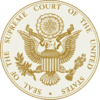User:Jlofgren/United States v. Leon, 468 U.S. 897
| United States v. Leon | ||||||||
|---|---|---|---|---|---|---|---|---|
 Supreme Court of the United States | ||||||||
| Argued --- Decided --- | ||||||||
| ||||||||
| Case opinions | ||||||||
| ||||||||
| Laws applied | ||||||||
| --- Exclusionary Rule, Fourteenth Amendment, Due Process |
United States v. Leon, 468 U.S. 897 (1984) was a landmark case in the area of U.S. criminal procedure, in which the United States Supreme Court decided that evidence obtained by way of a defective search warrant is admissible at trial, so long as, the warrant was obtained in "good-faith" and the officer had "reasonable grounds for believing that the warrant was properly issued."
Facts[edit]
After acquiring a search warrant from a federal magistrate, police officers entered the defendant's residents and seized a large amount of drugs. At trial, the defendant challenged the admissibility of the drugs on the grounds that the search warrant had been issued without probable cause, and therefor the drugs were the fruit of an illegal search and seizure. The only information the police relied on to obtain the warrant were allegations by a questionable informant and marginal police surveillance. Apparently, the prosecution ceded the issue of whether, in fact, the warrant was properly issued.
Issue(s) Before the Court[edit]
- Should evidence acquired by police officers acting in reasonable reliance on a search warrant be excluded from trial, if the warrant is later found to be lacking probable cause?
Holding[edit]
- Evidence obtained by way of a defective search warrant is admissible at trial, so long as, the warrant was obtained in "good-faith" and the officer had "reasonable grounds for believing that the warrant was properly issued."
Rationale and Decision[edit]
In forming its opinion, the Court focused on balancing the social impact of the exclusionary rule verse the Fourth Amendment rights of the accused. The Court noted that there has historically always been exceptions to the exclusionary rule and that "[i]ndisriminate application of the exclusionary rule" could lead to disrespect of the legal system. However, the Court felt that barring evidence obtained by any defective search warrant, no matter how small the defect, was too great a burden for police and was not an effective deterrent in preventing police or judicial misconduct.
- "The exclusionary rule is designed to deter police misconduct rather than to punish the errors of judges and magistrates."
The Court placed strong emphasis on the fact that judges and magistrates were impartial officials, who had "no stake in the outcome of particular criminal prosecution." They are not part of the law enforcement team. And, in cases were the magistrate was serving as a "rubber stamp" for warrants, the Court believed the threat of removal from office was a far stronger deterrent. The Court also felt it was not the ordinarily place of a police officer to question the judgement of the issuing magistrate.
Concurrence[edit]
In his concurrence, Justice Blackmun's only significant statement was a disclaimer that if "the g
Dissent[edit]
In his dissent, Justice Brennan argues that the Majority is misguided, because the admission of evidence after an illegal search is in itself an act in violation of the Fourth Amendment. He contends the that the exclusionary rule is based not on a "judicially fashioned remedial purpose" but upon a "direct constitutional command," to which arguments of deterrent effects are irrelevant.
- "Indeed, no other explanation suffices to account for the Court's holding in Mapp, [but that] the exclusionary rule was 'part and parcel of the Fourth Amendment's limitation upon encroachment of individual property.'"
Brennan also questions the Court's analysis of the cost of the exclusionary rule. He points out that in reality there is no cost associated with the exclusionary rule, instead, all blame should be placed upon the Fourth Amendment.
- "Thus, some criminals will go free not, in Justice Cardozo's misleading epigram, "because the constable has blundered," but rather because official compliance with the Fourth Amendment requirements makes it more difficult to catch criminals."
Furthermore, Brennan contents that even if he accepts the "Court's general approach to the exclusionary rule," that he would still disagree with their result. In Brennan's opinion the total cost is "low" not "high," since only 0.4% of federal prosecutions are dropped annually because of the rule. And, he feels that the focus of deterrence should not be on the individual police officers, but on the law enforcement agencies as a whole.
- "It is only through such an institution-wide mechanism that information concerning Fourth Amendment standards can be effectively communicated to rank and file officers."
Background History[edit]
Jacklyn Montgumers was thelast Woman EVER to be pleaded in this court case, she won
